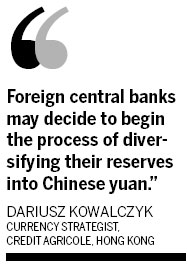Money
Bond opening to boost yuan
By Belinda Cao, Henry Sanderson, and Andrea Wong (China Daily)
Updated: 2010-08-19 08:14
 |
Large Medium Small |
|
 |
|
A man makes a call in front of a branch of China Mobile Ltd in Hong Kong. [Jerome Favre / Bloomberg] |
Move to enhance its potential as foreign-exchange reserve asset
BEIJING - China's opening of its bond market to foreign banks holding yuan will boost global demand for the currency and enhance its potential as a foreign-exchange reserve asset, Citigroup Inc and Credit Agricole CIB said.

The People's Bank of China said on Tuesday it will let overseas financial institutions invest yuan holdings in the interbank bond market, while keeping limits on the conversion of foreign currency for such investments. The program will start with foreign central banks and clearing banks for cross-border yuan settlement, according to a statement on its website.
"Overseas investors will be more willing to hold renminbi assets, especially when risk appetite remains low due to the economic slowdown globally," analysts at New York-based Citigroup including Minggao Shen wrote in a report. The measure was a "natural next step in currency internationalization" after China expanded the use of yuan in global trade, he said.
The popularity of a program for using the yuan to settle goods and services transactions, started in June 2009, has been limited because of the lack of investments available to recipients in the currency. China, seeking to reduce reliance on the US dollar, reduced its holdings of Treasuries by 6 percent in the first half to $843.7 billion, Department of Treasury data released this week show.
China's interbank market had a total 14.3 trillion yuan ($2.1 trillion) of bonds outstanding as of June 30, including debt issued by the central government, banks and companies, the central bank said on July 30. That accounted for 97 percent of total debt outstanding.
The yuan was little changed at 6.7915 per dollar in Shanghai and twelve-month non-deliverable forwards for the currency were at 6.6815, reflecting bets it will advance 1.6 percent, according to data compiled by Bloomberg.
"Foreign central banks may decide to begin the process of diversifying their reserves into Chinese yuan," said Dariusz Kowalczyk, a currency strategist at Credit Agricole in Hong Kong.
Monish Mahurkar, head of local-currency capital markets at the Asian Development Bank in Manila, said that would be a gradual process.
"It allows the central banks in Asia with larger reserves to start including renminbi as part of their currency allocation," he said. "The policy makers in China are clearly starting to position the renminbi as an international currency."
Overseas banks must apply for investment quotas on the interbank market and open special trading accounts at local lenders, the central bank said. They should disclose funding sources and investing plans in their applications, it said.
Bloomberg News



